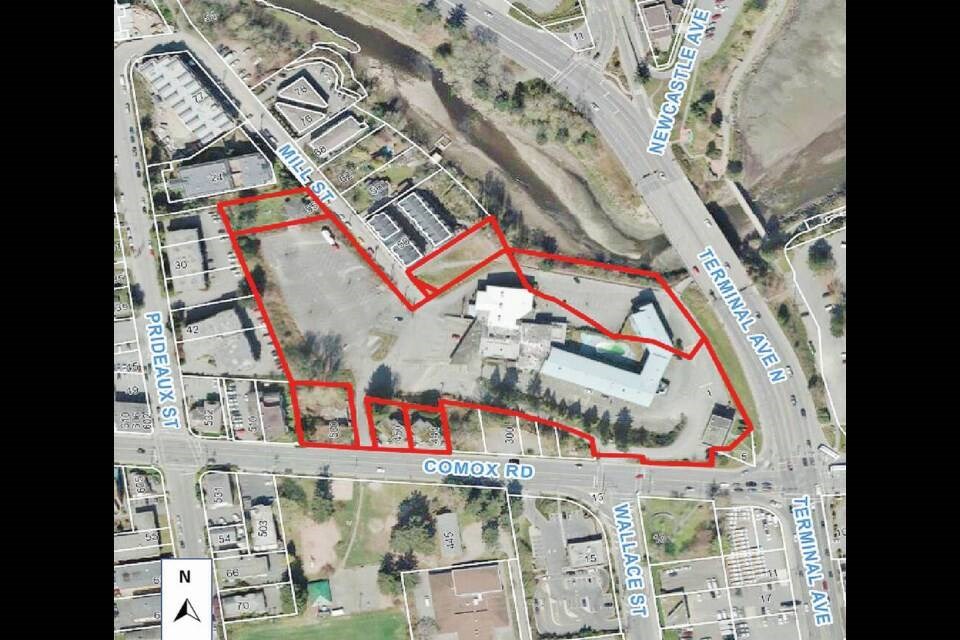Plans to build 760 homes in Nanaimo near the Millstone River have been delayed after the Snuneymuxw First Nation said its concerns have not been properly addressed.
The provincial government stepped in and has convinced Nanaimo council to postpone a decision on the Millstone Riverfront project. It is advocating for a mediation process to resolve issues involving the First Nation, city, developer and the province.
City council had been scheduled to vote Monday on final reading for the project, located on the northwest of downtown where the former Howard Johnson hotel once stood.
But after receiving a Friday letter from Tom McCarthy, deputy minister with the Ministry of Indigenous Relations and Reconciliation, council agreed to defer the vote until Sept. 25.
Developer Brad Martin said in a Tuesday statement that the postponement “should send a shiver down the spine of any residential home builder or private property owner.”
He warns the deferral could kill the project.
Along with new housing, the project would include 134-room hotel, 10,000 square feet of commercial space, and improvements next to the river.
The Snuneymuxw First Nation voiced strong opposition in May about development plans on the historic Sxwayxum village site.
Chief Mike Wyse warned then that the project could face delays if the nation’s concerns were not addressed.
“Any attempts to develop this ancestral village site will be plagued by opposition from our nation, delays from inevitable archaeological discoveries, and other challenges that are insurmountable without our involvement,” he said then.
“By working together, we can accomplish outcomes for the betterment of all.”
The nation said that the village was occupied when the Snuneymuxw Treaty was signed in 1854. It was supposed to be protected but the land was taken and given to private owners who developed it.
That area remains “rich in cultural, spiritual and archaeological value for our people,” Wyse said.
McCarthy said the province recently appointed Lorne Brownsey as an independent fact finder to “identify pathways to resolving the issues involving your city, the Snuneymuxw First Nation, and Oakwood Park Estates (developer) that are associated with this rezoning and proposed development.”
Brownsey has met with all the parties. If they agree, Brownsey will set up a negotiation process with the parties including the province, McCarthy said.
The goal would be to “negotiate mutually agreeable understandings in the coming months,” he said.
As well, the B.C. archaeology branch has not yet reviewed an archaeological impact assessment report, McCarthy said.
”It is important that time be provided for this work to take place,” he said.
”My view is that the multi-party negotiation, particularly led by a skilled and experienced former public
servant such as Lorne Brownsey, has the potential to reach a successful resolution that meets the interests of all parties.”
Martin had urged council to go ahead with its planned Monday vote, saying no new information had come forward, he said.
The developer is facing high monthly costs while unable to start on the project, he said.
As for the 2021 archaeology report, the city has already reviewed it and it went to the province and First Nation, Martin said.
Nanaimo desperately needs more housing and investment to revitalize its downtown core, he said.
By deferring its decision council “has taken steps that will at best simply drive up the costs to home
buyers and at worst, may cause this project to fail altogether,” Martin said.
It is alarming to see the province intervene at the last moment “to attempt to influence the city’s decision-making,” he said.
It is the responsibility of the province and local governments to address unresolved First Nations land claims, he said.
“It begs the question – what are our legal rights on privately held land in B.C.?”
>>> To comment on this article, write a letter to the editor: [email protected]



